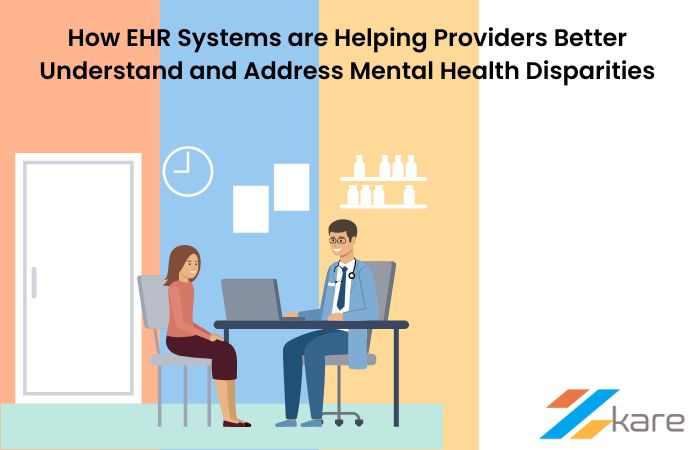
EHR Systems, Mental health EHR
Mental health disparities are a pressing problem that affects people from various backgrounds, but sadly, not all groups have equal access to the care they require. In recent years, Electronic health record (EHR) systems have developed into a crucial tool for healthcare providers to address mental health disparities and enhance client outcomes.
By utilizing EHR systems, practitioners can better understand various populations’ unique requirements and challenges, implement focus interventions and identify care disparities to close the gap. In this blog, we’ll look at how EHR systems are assisting healthcare professionals in addressing mental health disparities and the different ways that technology is being applied to enhance care and outcomes for individuals.
How are EHR systems helping providers tackle mental health disparities?
EHR (Electronic Health Record) systems have completely changed how healthcare professionals provide care, especially in mental health. EHR systems significantly assist providers in addressing mental health disparities by offering a comprehensive view of clients’ physical and mental health records.
For instance, EHR systems can assist in identifying trends in the occurrence of mental health problems in particular areas or demographic groups, such as those with lower incomes. With this knowledge, service providers can create customized programs and treatments designed to address these groups’ particular requirements. Also, providers can keep track of results and development over time, modifying their interventions as necessary.
Improving access to care is another way that EHR systems assist in addressing mental health disparities. In remote or underserved areas, clients can receive mental health services thanks to telehealth, which has grown in popularity since the COVID-19 pandemic. EHR systems can make telehealth visits easier by offering secure video conferencing technologies and ensuring that providers can access clients’ records and other essential data.
EHR systems can also assist providers in addressing cultural and language barriers that can restrict individuals from seeking or receiving care. They can assist in ensuring that clients from different backgrounds can receive the care they require in a way that is comfortable and accessible by offering translated clients portals and multilingual documentation.
Innovative ways in which EHR technology is being used to improve mental health outcomes
In addition to helping providers tackle mental health disparities, Electronic Health Record (EHR) technology is also being used innovatively to improve mental health access and client outcomes. Here are some examples:
Artificial intelligence (AI): AI algorithms can be combined with EHR technology to assist medical professionals in making more precise diagnoses and creating more efficient treatment plans. It can help healthcare providers identify clients at risk for mental health problems and implement an early intervention.
Predictive analytics: With EHR technology, predictive analytics models can be created to help identify individuals at risk of experiencing mental health problems. This can enable medical professionals to step in early and stop the emergence of more severe mental health issues.
Client portals: Clients portals that let providers individually access clients’ medical records, connect with their providers, make appointments, and renew medications can be developed using EHR technology. This can increase patient involvement and encourage people to participate in their mental health treatment actively.
Final thoughts
In conclusion, EHR systems are an effective tool that can assist professionals in comprehending and addressing disparities in mental health. By offering a comprehensive view of client health history, classifying disparities in care, enhancing access to care, and overcoming language and cultural barriers, EHR systems are playing an essential part in ensuring that all clients are receiving the mental health care they need to live a healthy and satisfying life.